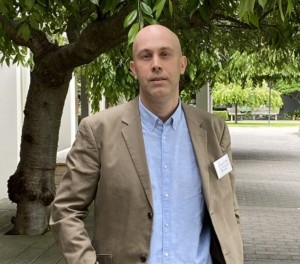September 27, 2021

Dr Emre Erturk
The Research and Innovation Centre has begun a Q&A series with EIT researchers. Our latest interview is with Dr Emre Erturk, Principal Academic Staff Member, Programme Coordinator for Postgraduate/Master of IT at EIT’s School of Computing.
How long have you been a researcher?
One of my previous roles was Institutional Research Associate in 2006 while working on my Ph.D. – that goes back fifteen years. But my most active writing and publishing has been in the last ten years.
Why do you enjoy doing (quantitative and qualitative) research?
Even though I have looked at technology from various perspectives, my research has been primarily positivist. Math was one of my favourite subjects in school while using my first computer. I went on to like statistics and quantitative methods in university.
What research have you done recently or are currently working on?
I am working on ‘Digital Divide’ and ‘Digital Inclusion’. Digital Divide occurs when there is a gap between those who take full advantage of the Internet and current information technologies and those who are digitally excluded – due to socio-economic and geographic factors – and unable to participate fully in online education, government and commerce.
However, since these are now standard concepts, I am trying to extend them to more recent topics such as smart cities and digital citizenship. This fits in with my empirical approach – digital inclusion or the smartness of a city can hypothetically be objectively/quantitatively measured.
When and where has or will this be published?
I presented some initial thoughts and proposals at an IEEE conference held online but based at Imperial College (UK). Some researchers, including I, think that a Smart City no longer has to be a metropolitan or industrially advanced city. Technology is always becoming inexpensive and easy to use such that these sensors and gadgets can form an intelligent and interconnected habitat for most people.
What has been your most significant research project?
Cloud Computing has been my favourite topic because it has theoretical aspects (e.g. technology adoption, economics of technology) as well as doing things as hands on (e.g. implementing and testing software). I really enjoy the topic. It has generated a great number of outputs for me.
What difference has it made/what impact has it had?
My ‘Cloud’ related outputs have been read by thousands around the world and cited not only by practitioners but also by experienced researchers in Elsevier and Springer journals and ACM and IEEE conferences. Among these, I have seen not only writers in the regular western countries but from others such as Cuba and Oman. This gives me confidence that academic writing can be very comprehensible, and this research may be relatively uncomplicated – but it will resonate well with other people in the same field. Particularly interesting are the citations from Ph.D. and Master’s theses, which means that my works were part of their foundational literature review.
